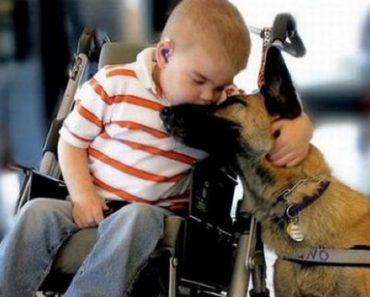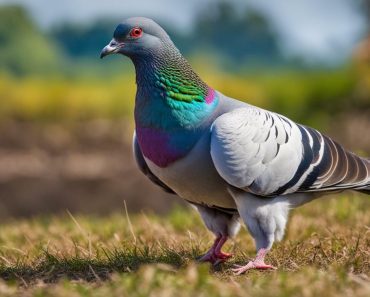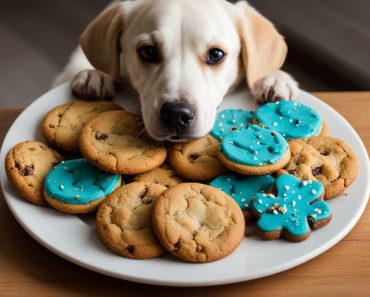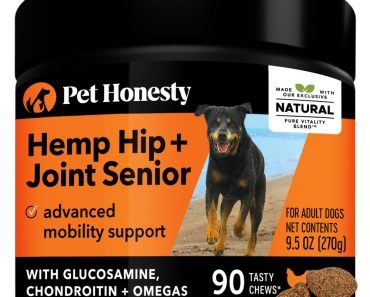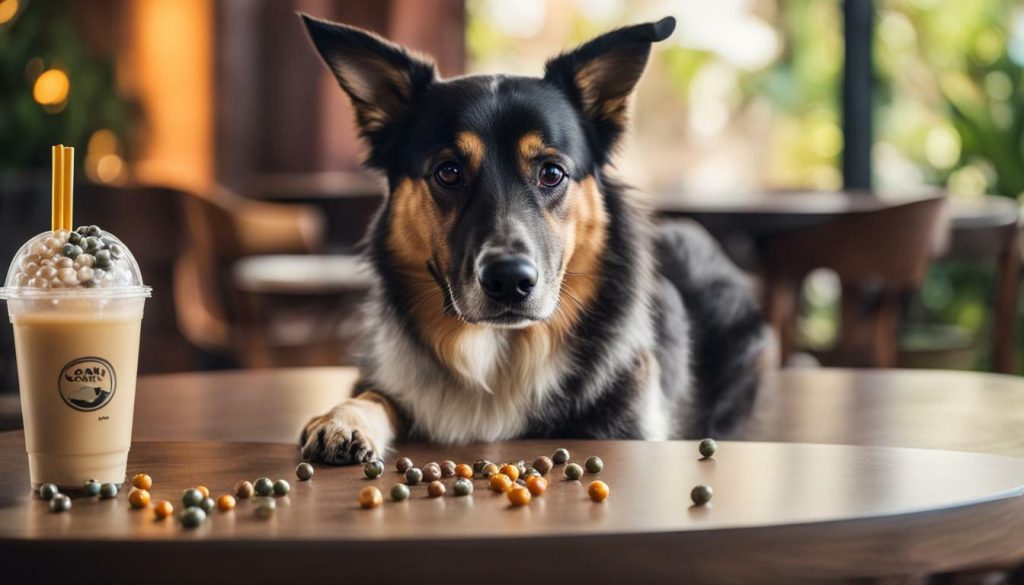
Many dog owners wonder if sharing their boba tea with their furry companions is safe, but can dogs eat boba?
- Boba tea is unsuitable for dogs due to its ingredients like milk, sweeteners, flavored syrups, and artificial colors.
- Boba tea’s high sugar content and calories can harm dogs if consumed in large quantities.
- Due to lactose intolerance, dogs may experience digestive issues if they consume boba tea.
- The chewy tapioca pearls in boba tea can pose a choking hazard and cause intestinal blockage if not properly chewed.
- Providing dogs with safe treats and a balanced diet is better than sharing boba tea.
Understanding the Ingredients of Boba Tea
To determine whether dogs can safely consume boba tea, we must understand its ingredients and how they might impact our furry friends. While the tapioca pearls used in boba are generally safe for dogs to eat in moderation, it’s essential to consider the other components of this popular beverage.
Milk: Many boba teas contain milk or milk-based products. Dogs, particularly adult dogs, are often lactose intolerant, lacking the necessary enzymes to digest lactose properly. Consuming milk can lead to stomach upset, bloating, and diarrhea in dogs.
Sweeteners and flavored syrups: Boba teas often contain sweeteners like sugar and flavored syrups to enhance their taste. Remembering excess sugar can harm dogs, leading to weight gain, dental problems, and even conditions like diabetes. Similarly, artificial flavors and syrups may contain additives that could cause allergic reactions or digestive issues in dogs.
Artificial colors: Boba teas commonly use artificial food coloring to achieve vibrant and enticing hues. While these colorings are safe for human consumption, some dogs may have sensitivities or allergies. Ingesting artificial colors can cause gastrointestinal upset and, in rare cases, may trigger more severe reactions in sensitive individuals.
| Ingredients | Potential Impact on Dogs |
|---|---|
| Milk | Lactose intolerance, stomach upset, diarrhea |
| Sweeteners and flavored syrups | Weight gain, dental problems, potential allergies, or digestive issues |
| Artificial colors | Possible gastrointestinal upset, rare allergic reactions |
While plain tapioca pearls, when cooked and given in small quantities, can be a safe treat for dogs, it’s crucial to exercise caution to avoid potential choking hazards or intestinal blockage. Always monitor your dog when offering tapioca pearls and ensure they are adequately chewed before swallowing.
Overall, it’s best to prioritize your dog’s health and well-being by providing them with a balanced, dog-friendly diet and avoiding the temptation to share boba tea. Instead, opt for safe treat alternatives specifically formulated for dogs to ensure their nutritional needs are met.
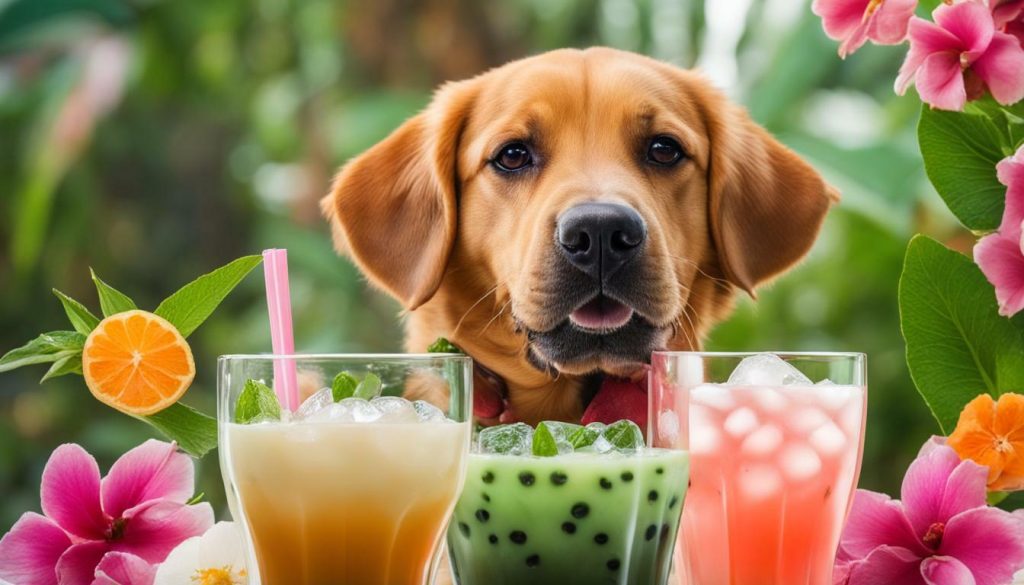
- PetMD: Can Dogs Have Milk? What to Know About Dogs and Dairy
- American Kennel Club: Can Dogs Eat This? The Ultimate Guide to 105 Food Items
- Healthline: Food Coloring: Good or Bad?
The Risks of Boba Tea for Dogs
While boba tea may be a delicious treat for humans, it can pose several risks to dogs if consumed in significant quantities. The ingredients commonly found in boba tea, including milk, sweeteners, flavored syrups, and artificial colors, can harm our furry friends. As responsible pet owners, it is crucial to understand and minimize these risks to ensure the well-being of our canine companions.
One of the main concerns regarding dogs consuming boba tea is the high sugar content. Excessive sugar intake can lead to obesity, dental problems, and even cause issues with insulin regulation in dogs. Furthermore, the calorie content in boba tea can contribute to weight gain and other health complications. It is important to remember that dogs have different dietary needs than humans, and excessive sugar consumption can have severe consequences.
Lactose intolerance is another factor to consider. Many dogs are lactose intolerant, meaning their bodies cannot properly digest lactose, the sugar found in milk. Boba tea, which often contains milk, can trigger digestive issues like bloating, gas, and diarrhea in lactose-intolerant dogs. Opting for lactose-free alternatives or excluding boba tea is advisable to prevent these uncomfortable and potentially harmful reactions.
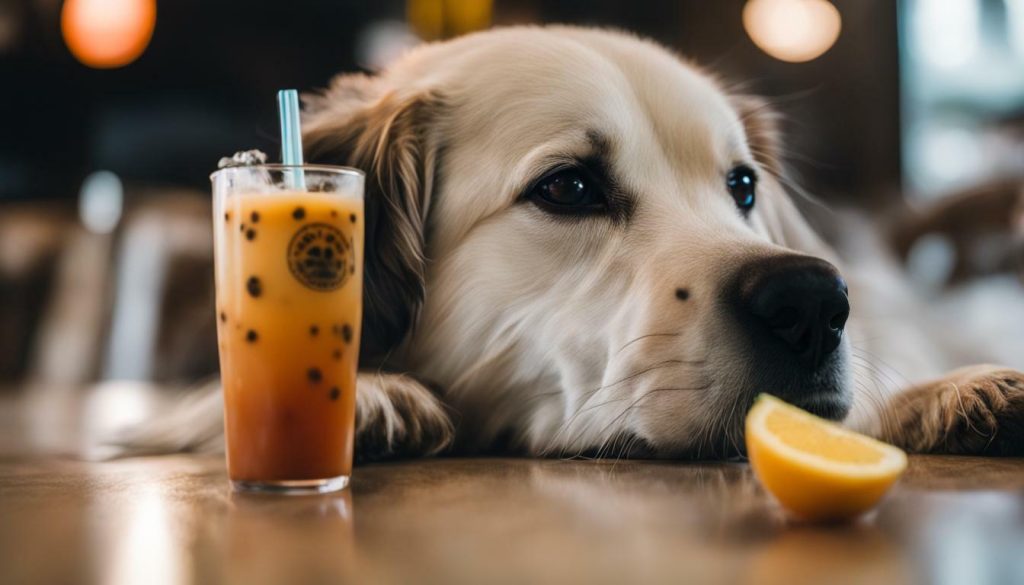
While most of the ingredients in boba tea are unsuitable for dogs, plain tapioca pearls can be a safe treat option when cooked and given in small quantities. These chewy pearls are typically made from cassava starch and do not pose any immediate risks to dogs. However, it is crucial to exercise caution to prevent potential choking or intestinal blockage. Always supervise your dog while they enjoy tapioca pearls and ensure they are properly chewed before swallowing. Monitor their digestion, and if any concerns arise, consult with your veterinarian.
In conclusion, while dogs can technically consume tapioca pearls in moderation, it is best to avoid sharing boba tea with them due to the potential risks associated with other ingredients. Instead, prioritize their well-being by providing a balanced, dog-friendly diet and safe treatment alternatives. If you have any doubts or questions about your dog’s dietary needs, consult a veterinarian who can provide tailored advice based on your dog’s health requirements.
Tapioca Pearls: The Safe Element of Boba Tea
Among the various components of boba tea, tapioca pearls are a potentially safer element for dogs if consumed responsibly. While dogs should not be given boba tea due to its harmful ingredients, plain tapioca pearls can be cooked and offered as a special treat. However, it is crucial to exercise caution to prevent any potential choking hazards or intestinal blockages.
When preparing tapioca pearls for dogs, it is important to ensure they are cooked thoroughly. Raw or undercooked pearls can be difficult for dogs to digest, potentially leading to gastrointestinal issues. By cooking the pearls until they are soft and chewy, you can minimize the risk of any digestive problems.
To safely serve tapioca pearls to your furry friend, follow these simple steps:
- Prepare a small batch of tapioca pearls according to the package instructions.
- Cook them until they are soft and chewy.
- Allow the pearls to cool completely before giving them to your dog.
- Offer your dog a special treat in small quantities, ensuring they can chew and swallow them comfortably.
Remember, moderation is key. Tapioca pearls should only be given to dogs as an occasional treat and should never replace their regular balanced diet. It is always wise to consult your veterinarian before introducing new foods or treats into your dog’s diet.
| Tapioca Pearls: The Safe Element of Boba Tea | |
|---|---|
| Tapioca pearls are safe for dogs to eat in moderation | ✔ |
| Ensure tapioca pearls are properly cooked before serving | ✔ |
| Offer tapioca pearls as an occasional treat, not a regular part of their diet | ✔ |
| Consult with your veterinarian before introducing new foods or treats | ✔ |
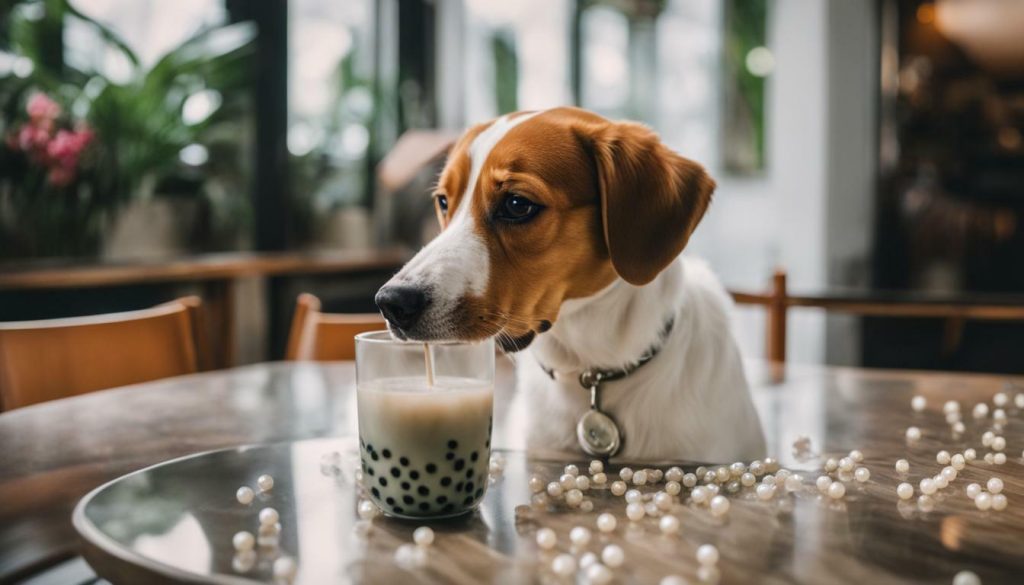
The Importance of Moderation
Regarding dogs and boba, moderation ensures their well-being and avoids potential health issues. While dogs can safely consume plain tapioca pearls in small quantities as a treat, it is important to be cautious and avoid sharing boba tea with them. The other ingredients commonly found in boba tea, such as milk, sweeteners, flavored syrups, and artificial colors, can harm dogs if ingested in large amounts.
Excessive sugar intake can lead to obesity and dental problems in dogs, while high-calorie content can disrupt their overall nutritional balance. Additionally, lactose, found in milk-based boba tea, can cause digestive issues for dogs with lactose intolerance. The chewy tapioca pearls pose a choking hazard and can result in intestinal blockage if not properly chewed or consumed in large quantities.
To ensure the well-being of our furry friends, it is best to provide them with safe treats and a balanced diet that meets their specific nutritional needs. There are numerous alternatives available that are specially formulated for dogs, offering a variety of flavors and textures that can satisfy their cravings without compromising their health. We can keep our dogs safe and healthy by practicing moderation and making informed choices.
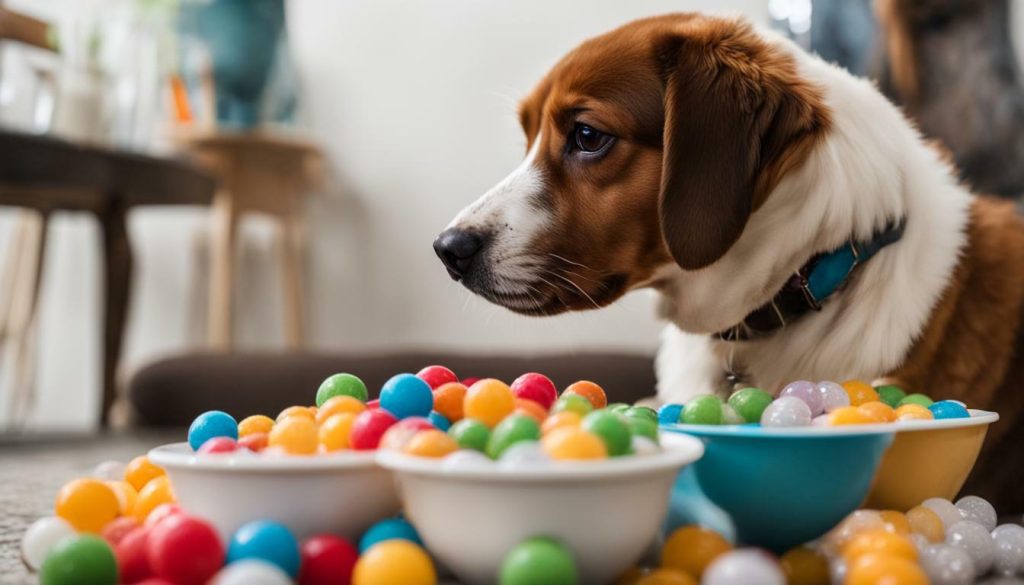
| Benefits of Moderation: |
|---|
| Prevents obesity and dental problems |
| Reduces the risk of digestive issues |
| Avoids potential choking hazards and intestinal blockage |
| Promotes a balanced diet and overall well-being |
The Dangers of Artificial Colors and Flavored Syrups
Artificial colors and flavored syrups, common ingredients in boba tea, may harm dogs and should be avoided. These additives contain chemicals and artificial dyes that can adversely affect a dog’s health. Dogs have a different digestive system than humans, and certain artificial ingredients can cause digestive issues, allergies, or even toxicity in dogs.
While humans may enjoy boba tea’s vibrant colors and flavors, dogs can react differently to these additives. Artificial colors have been linked to allergic reactions and can cause gastrointestinal upset in dogs. Flavored syrups, especially those high in sugar or artificial sweeteners, can lead to weight gain, dental problems, and potential risks associated with insulin regulation.
As responsible pet owners, it’s important to prioritize our dogs’ well-being and provide them with a balanced diet free from potentially harmful ingredients. When it comes to boba tea, it’s best to err on the side of caution and avoid sharing it with our furry friends. Instead, we can opt for safe and healthy treat alternatives specifically formulated for dogs.
| Artificial colors and flavored syrups in boba tea | Dangers for dogs |
|---|---|
| Allergic reactions | Can cause allergies in dogs |
| Digestive issues | May lead to gastrointestinal upset |
| Weight gain and dental problems | High sugar content can contribute to weight gain and dental issues |
| Insulin regulation | Potential risks associated with insulin regulation |
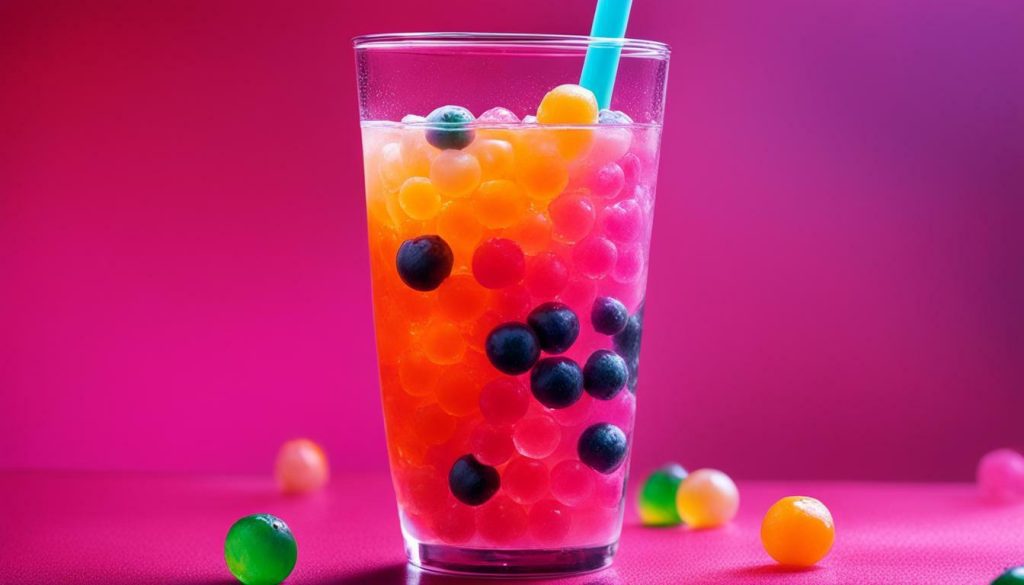
“As responsible pet owners, it’s important to prioritize our dogs’ well-being and provide them with a balanced diet free from potentially harmful ingredients.”
Conclusion
While tapioca pearls used in boba can be safe for dogs in moderation, it’s best to avoid sharing boba tea with them due to the potential dangers of artificial colors and flavored syrups. These additives can cause allergic reactions, digestive issues, weight gain, dental problems, and potential risks associated with dog insulin regulation. As dog owners, we should prioritize their health and seek safe treatment alternatives specifically formulated for dogs. Remember, a balanced and nutritious diet is essential for maintaining our furry friends’ overall well-being.
Boba Tea’s High Sugar Content
The high sugar content in boba tea can harm dogs’ health if consumed in excess. Dogs have different nutritional needs than humans, and their bodies are not designed to process large amounts of sugar efficiently. When dogs consume sugary drinks like boba tea, it can lead to various health issues.
Excessive sugar intake can contribute to obesity in dogs. Obesity can lead to various health problems, including diabetes, joint issues, and heart disease. The empty calories from the sugar in boba tea can also displace the nutrients in a dog’s diet, leading to nutritional imbalances.
Moreover, the high sugar content in boba tea can negatively impact a dog’s dental health. The sugar provides a breeding ground for harmful bacteria in the mouth, leading to tooth decay, gum disease, and bad breath. Regular consumption of sugary beverages like boba tea can contribute to dental issues in dogs.
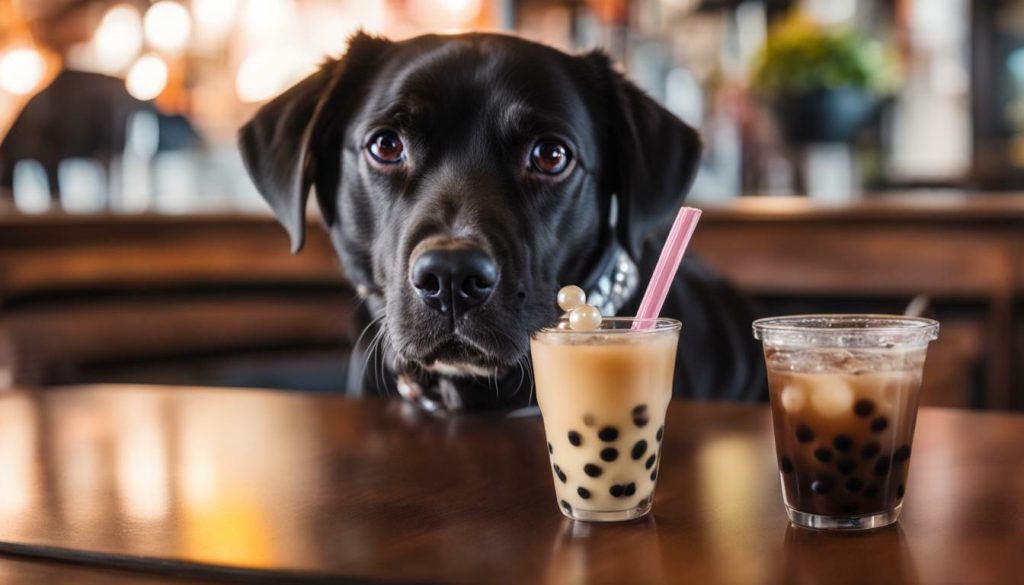
| Health Effects of Boba Tea on Dogs: |
|---|
| Obesity |
| Diabetes |
| Joint Issues |
| Heart Disease |
| Tooth Decay |
| Gum Disease |
| Bad Breath |
It is essential to prioritize a balanced diet for dogs and provide them with suitable treats specifically formulated for their nutritional needs. While a small taste of boba tea may not cause immediate harm, it is best to avoid giving dogs sugary beverages like boba tea regularly to protect their overall health and well-being.
Lactose Intolerance and Boba Tea
Many dogs are lactose intolerant, and boba milk tea’s inclusion of dairy can lead to digestive discomfort and other health problems. Lactose intolerance occurs when dogs lack the enzyme lactase needed to break down lactose, the sugar in milk. Lactose is not properly digested and can cause symptoms such as diarrhea, gas, bloating, and stomach upset.
Feeding boba milk tea to lactose-intolerant dogs can exacerbate these symptoms and potentially lead to more serious issues. Additionally, the high sugar content in boba milk tea can further disrupt your dog’s digestive system and even contribute to obesity if consumed regularly.
As a responsible dog owner, it’s essential to consider lactose-free alternatives for your furry friend. Various lactose-free milk options on the market can still provide a creamy texture without the adverse effects of lactose. It’s important to consult your veterinarian to determine the best dietary choices for your dog’s needs.
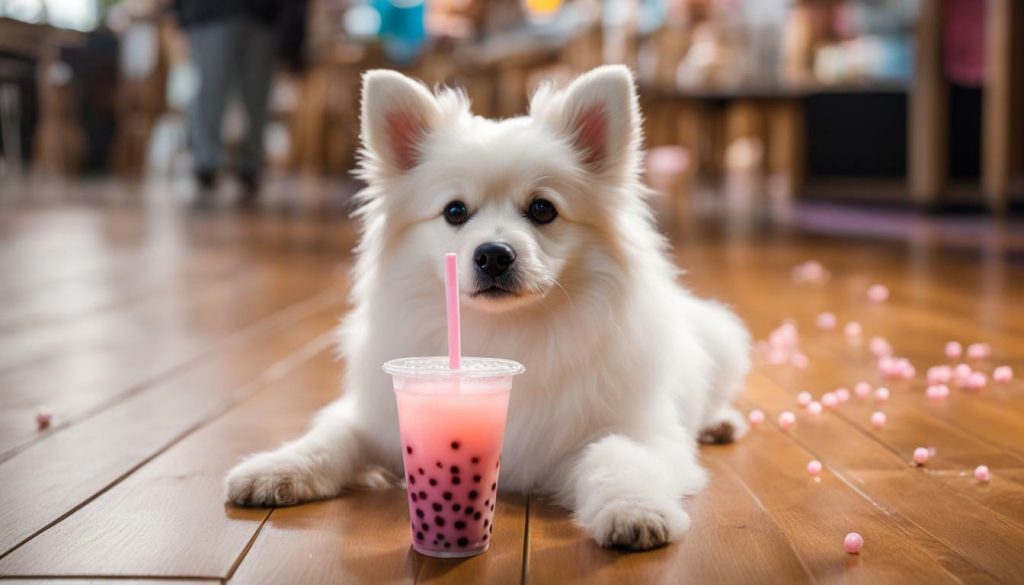
Aside from the lactose content, it’s crucial to know the potential dangers of artificial colors and flavored syrups commonly used in boba tea. These additives can lead to allergic reactions in dogs, causing symptoms like itching, hives, and gastrointestinal distress.
Furthermore, artificial colors and flavored syrups can also disrupt your dog’s digestive system and cause unnecessary stress on their organs. It’s important to prioritize their well-being by avoiding unnecessary exposure to these potentially harmful ingredients.
When choosing treats or beverages for your dog, always opt for natural and dog-friendly options. Consider making your homemade treats using canine-safe ingredients, or seek out reputable pet stores that offer a wide range of healthy and safe treats for your furry companion.
| Summary | Section |
|---|---|
| Lactose intolerance in dogs can lead to digestive discomfort and health problems | Lactose Intolerance and Boba Tea |
| Artificial colors and flavored syrups in boba tea can cause allergic reactions and disrupt a dog’s digestive system | The Dangers of Artificial Colors and Flavored Syrups |
Choking Hazard and Intestinal Blockage
The texture of tapioca pearls in boba tea can be a choking hazard for dogs and may cause intestinal blockage if not consumed cautiously. While dogs may be tempted to gulp down the chewy pearls, ensuring they are properly chewed before swallowing is essential. Taking time to savor each bite and encouraging slower eating habits can reduce the risk of choking or blockage.
In some cases, dogs predisposed to gulp their food, or those with smaller mouths may be more susceptible to these hazards. Owners should be vigilant in supervising their pets while consuming boba tea and immediately address any signs of distress or discomfort.
| Signs of Choking or Intestinal Blockage in Dogs |
|---|
| Drooling excessively |
| Difficulty breathing |
| Coughing or gagging |
| Lethargy or weakness |
| Vomiting or retching |
| Loss of appetite |
If any of these symptoms occur after your dog has consumed boba tea or tapioca pearls, it is crucial to seek immediate veterinary attention. Prompt intervention can help prevent further complications and ensure your dog’s well-being.
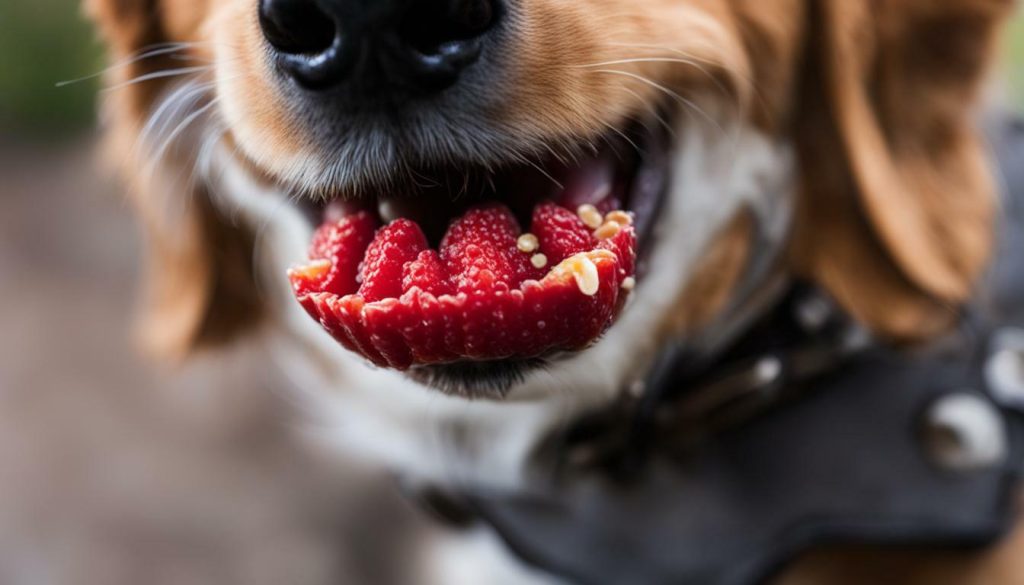
- Offer plain, cooked tapioca pearls in small quantities as a treat rather than including them in boba tea.
- Supervise your dog while they consume treats or chew on toys, including tapioca pearls.
- If your dog tends to gulp down food, consider using slow feeders or puzzle toys to encourage slower eating habits.
- Monitor your dog’s behavior closely after consuming boba tea or tapioca pearls to identify signs of distress.
- Consult with your veterinarian to understand your dog’s specific dietary needs and ensure they receive a balanced diet.
Remember, the well-being of your furry friend should always be a top priority. While the idea of sharing boba tea with your dog may seem tempting, it is essential to prioritize their health by avoiding potentially harmful ingredients and ensuring their safety.
Safe Treat Alternatives for Dogs
Instead of sharing boba tea with your dog, it’s best to explore safe treat alternatives that cater to their specific dietary requirements. While boba tea may be a popular human beverage, it contains ingredients that can harm our furry friends. Here are some dog-friendly treats that you can offer instead:
- Carrot sticks: Dogs love the crunchy texture of carrots, and they are packed with vitamins and fiber that promote good digestion.
- Plain-boiled chicken: A lean source of protein, plain-boiled chicken can be a tasty and nutritious treat for dogs. Just make sure to remove the skin and bones before serving.
- Frozen yogurt cubes: Plain, unsweetened yogurt can be frozen into small cubes and served as a refreshing treat on hot days. It’s a great source of probiotics that support a healthy gut.
- Peanut butter stuffed toys: Stuffing a Kong toy or similar treat dispenser with unsalted peanut butter can entertain your dog and give them a tasty snack.
- Apple slices: Apples are a crunchy, low-calorie treat that dogs enjoy. Remember to remove the seeds and core before offering them to your furry friend.
Always introduce new treats gradually and in moderation to avoid any digestive upsets. If you’re unsure about any specific treat or have concerns about your dog’s diet, it’s best to consult your veterinarian for personalized advice.
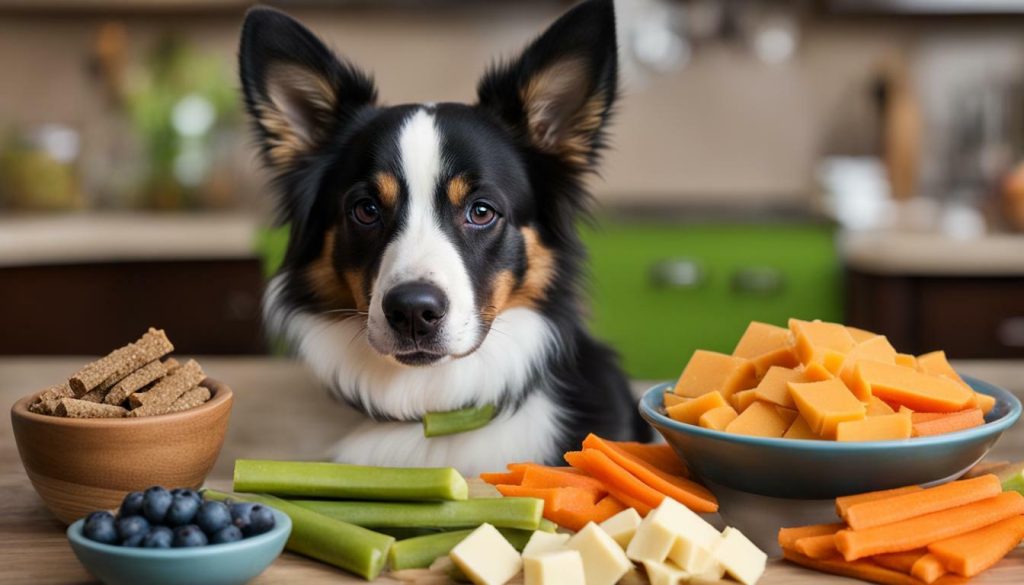
“While boba tea may be tempting to share with your dog, it’s important to remember that the ingredients in boba tea can be harmful to their health. Dogs have different nutritional needs, and it’s best to provide them with treats that are safe and appropriate for their diet. Stick to dog-friendly alternatives to ensure their well-being and prevent any potential health issues.”
By choosing safe treat alternatives for your dog, you can ensure their well-being and provide them with enjoyable snacks that won’t compromise their health. Remember to prioritize a balanced diet and consult a veterinarian for any concerns or questions regarding your dog’s dietary needs.
Ensuring Your Dog’s Well-being
As responsible dog owners, we must prioritize our pets’ well-being by providing them with a balanced diet and avoiding potentially harmful food and beverages like boba tea. While it may be tempting to share our favorite drinks with our furry friends, it’s important to understand that certain ingredients in boba tea can harm their health.
Boba tea’s high sugar content and artificial flavors can lead to obesity and dental problems, disrupting dog insulin regulation. Lactose intolerance can cause gastrointestinal issues if dogs consume boba milk tea. Considering these factors and opting for healthier alternatives specifically formulated for our canine companions is crucial.
One safe treat option for dogs is plain tapioca pearls, which can be cooked and given in small quantities as an occasional treat. However, exercising caution and preventing any potential choking hazard or intestinal blockage is vital to ensuring the pearls are properly chewed. Feeding them plain and cooked without additional ingredients or flavors is the safest way to incorporate tapioca pearls into your dog’s diet.
Remember, moderation is key. While indulging our dogs with boba tea can be tempting, it’s best to avoid sharing this beverage with them altogether. Instead, focus on providing a nutritious, balanced diet that meets their needs. Consulting with veterinarians is always a good idea, as they can provide professional guidance and advice tailored to your dog’s health and well-being.
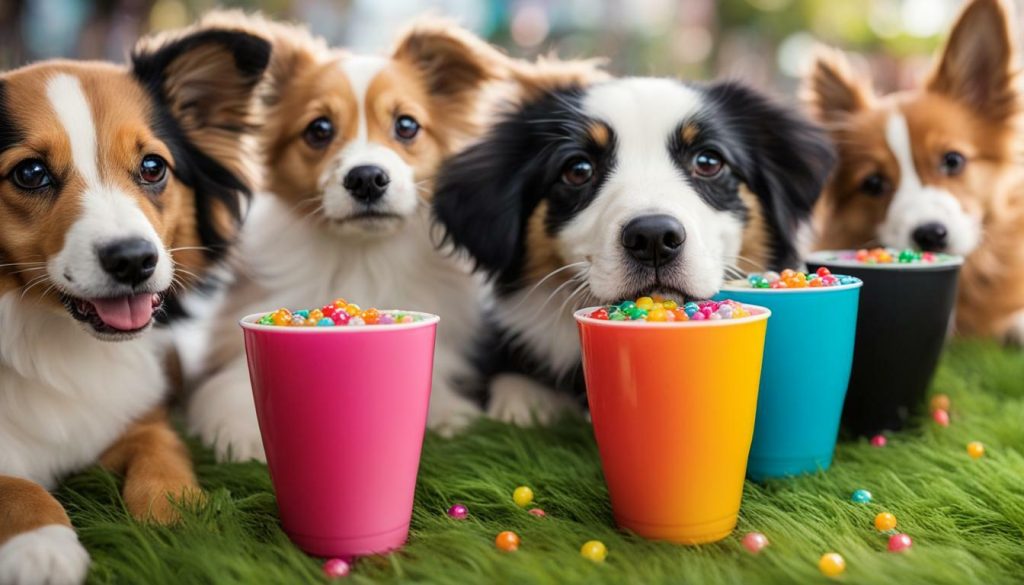
| Safe Treat Alternatives for Dogs |
|---|
| – Carrot sticks |
| – Frozen blueberries |
| – Peanut butter-filled Kongs |
| – Pumpkin puree |
| – Apples slices (without seeds) |
“As responsible pet owners, it’s our duty to prioritize our dogs’ health and well-being. While boba tea may be enjoyable for us, it’s important to remember that our dogs have different dietary needs. Opting for safe and healthy alternatives ensures that our furry friends can enjoy treats without compromising their health.”
– Dr. Emily Anderson, DVM
Conclusion
In conclusion, while dogs can safely consume plain tapioca pearls in moderation, it’s best to avoid feeding them boba tea due to the potential risks associated with its other ingredients. The high sugar content, calories, lactose, and choking hazard posed by tapioca pearls make boba tea unsuitable for regular consumption by dogs. Prioritizing our dogs’ well-being means providing them with a balanced diet and safe treatment alternatives specifically formulated for their nutritional needs. To ensure our pets’ health and happiness, consulting with veterinarians is always recommended.
Conclusion
In conclusion, dogs should not consume boba tea due to its potentially harmful ingredients and associated risks, including high sugar content, lactose intolerance, choking hazard, and intestinal blockage.
While the tapioca pearls used in boba are generally safe for dogs to eat in moderation, it is important to consider the other ingredients commonly found in boba tea. Milk, sweeteners, flavored syrups, and artificial colors can negatively affect dogs’ health. Boba tea’s high sugar content and calories are not suitable for pets in large quantities, as they can contribute to issues like obesity, dental problems, and potential risks associated with insulin regulation.
In addition, lactose intolerance is a common issue among dogs, and consuming boba milk tea can lead to digestive issues. The chewy tapioca pearls also pose a choking hazard and can cause intestinal blockage if not properly chewed or consumed excessively.
It is best to avoid sharing boba tea with dogs and instead provide them with safe treat alternatives that are formulated specifically for their nutritional needs. Ensuring their overall well-being involves maintaining a balanced diet and consulting with veterinarians for dietary concerns. By prioritizing the health of our furry friends, we can keep them happy and thriving for years to come.
FAQ
Can dogs eat boba?
No, it is not recommended for dogs to eat boba tea due to the potentially harmful ingredients and risks associated with it.
What ingredients in boba tea can be harmful to dogs?
The milk, sweeteners, flavored syrups, and artificial colors in boba tea can be harmful to dogs.
Why are these ingredients harmful to dogs?
The high sugar content, calories, and lactose in boba tea are not healthy for dogs in large quantities. The chewy tapioca pearls can also pose a choking hazard and cause intestinal blockage if not properly chewed.
Can dogs have tapioca pearls?
Plain tapioca pearls can be cooked and given to dogs in small quantities as a treat, but caution should be exercised to prevent choking or intestinal blockage.
Is boba tea safe for dogs?
Boba tea is not safe for dogs due to the potential risks and harmful ingredients. It is best to avoid sharing boba tea with dogs and provide them with safe treats and a balanced diet instead.
What are some safe treat alternatives for dogs?
There are many safe treat options specifically formulated for dogs that can be given as alternatives to boba tea.
How can I ensure my dog’s well-being?
It is important to prioritize a balanced diet and overall well-being for your dog. Consult with veterinarians for any dietary concerns and practice responsible pet ownership.
Can dogs have boba milk tea?
Dogs with lactose intolerance should not consume boba milk tea due to potential digestive issues. Consider lactose-free alternatives.
Why should I avoid giving boba tea to my dog?
Boba tea can have negative health effects on dogs, such as obesity, dental problems, potential risks associated with insulin regulation, and the risk of choking or intestinal blockage.

